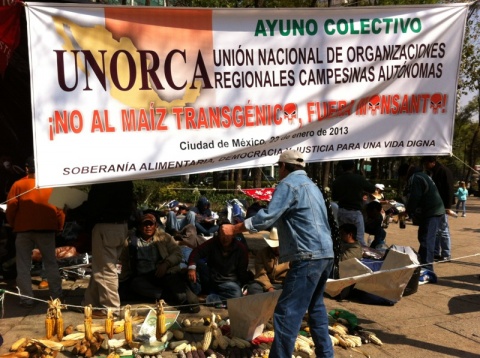Submitted by Silvia Ribeiro on

In the face of an imminent authorization of the Mexican Government’s to sow millions of hectares of GM maize in this country, several social networks and collectives in Oaxaca have declared 2013 as the Year of Resistance to GM maize and of defense of native maize, life and autonomy of the maize people. The most important genetic heritage of the Mesoamericans is at stake. It is the base of people’s autonomy and of food sovereignty, besides being the main grain for global sustenance. All this in favour of four multinationals’ profit, despite serious health and environmental risks. The Network in Defence of Maize addressed this issue in its first national assembly in 2013 as did other rural, urban and student organizations, like #YoSoy132 Ambiental (#Iam 132 Environmental). The Network in Defence of Maize, composed of 1200 indigenous and rural communities and dozens of civil society and communitarian organizations, reminded that the real moratorium is the one maintained by the communities, sowing their maize and preventing the use of unknown seeds, whether through government programs or others. The farmers from Northern Mexico have been kindly invited to discuss with the Network the impacts of GM since it will also be negative for them. Thirty peasants from Unorca (National Union of Autonomous Regional Peasant Organizations) and Via Campesina (International Peasant Movement) have started on January 23rd a hunger strike against GMOs and in defence of maize, camping by the Angel de la Independencia monument. The police’s harassment, declared Alberto Gomez, striker and coordinator of Via Campesina in North America, is very symbolic: they want to prevent the peasants from being in front of the monument to Independence serving this way their new masters: the neocolonialism of Monsanto, DuPont and Pioneer. The protests against GM maize keep growing. A few days ago, the Mexican government received a petition signed by 41,754 people from all over the world demanding to stop the sowing of GM maize in Mexico, as this subject is relevant worldwide since this is the geographical center of origin of maize. It is a warning that the world’s eyes are on this subject. This adds to other tens of thousands of signatures delivered earlier by Greenpeace and other organizations. he call made by the Union of Scientists Committed with Society to cancel all GM maize sowing, delivered to both outgoing and incoming Mexican governments by the end of November, is now supported by more than 3000 scientists and experts, many of them highly regarded in both national and international levels. It became a reference document, with solid scientific arguments against GMO spreading in their geographical center of origin. On the other hand, bad news keep arriving concerning human health impacts of GMO consumption. The pioneer study published by a French team of scientists that showed that GM maize caused cancer in mice, was recently followed by another scientific study was added (signed by Nancy Podevin and Patrick du Jardin) which was handed in to EFSA, the European Agency for Food Security. This study showed that the majority of the approved GMOs in the United States (54 of 86), contain viral genetic information that was hadn’t been identified previously. These viral genetic sequences could have detrimental effects on the plants, animals and humans. According to Jeffrey Smith, expert in GMO human health impacts, their direct or indirect consumption might make us more susceptible to viral infections, from the flu to hepatitis or AIDS. According to this study, among the GMOs that contain these viral components which caused cancer in mice are the Mon810 maize and the NK603 maize from Monsanto, two of the varieties that the government want to sow on a large scale in Mexico. The same goes to GM soy that is intended to be sowed in large areas in the Yucatan peninsula. In January 23rd, the European Commission announced its decision to freeze the process of authorization of GMO cultivation in the European Union until its mandate is over in 2014, because the authorizations of GMO cultivation poison the relationship between the Commission and the member states. This contrasts with the attitude of the Mexican Government - country at the center of the origin of this crop and its biggest human daily consumer – that is considering sowing large areas of GM maize and continuing GM soy, despite the presence of this potentially harmful virus in the respective GMO genome. There are no valid arguments to support GMO sowing in Mexico: there are better options without the added risks, whether to increase the country’s production (if it were needed, because Mexico already exceeds its maize production for human consumption) or to maintain the diversity and the seeds in the hands of peasants and indigenous people, their creators. In December 2012, in a demonstration in front of Sagarpa (Secretary of Agriculture, Livestock, Rural Development, Fisheries and Food) against GM maize, the Network in Defence of Maize, #Iam 132 Environmental, the Popular Urban Movement (MUP-CND), the Youth for National Emergency and the National Assembly of Environmentally Affected delivered the government their worries about GM maize and demanded its prohibition. The officers claimed that they would openly discuss the arguments and were therefore called to participate in a public debate about the GM maize in Mexico which took place in the Faculty of Sciences on February 7th at 11am, in the Alberto Barajas Celis auditorium, with the participation of scientists and social movements’ representatives. While the government tries to sell a cynic crusade against hunger, the GM maize would eliminate forever the possibility of a healthy and dignified nutrition to Mexicans. As Joel Aquino expressed, they intend to make the hit that they didn’t succeed 500 years ago.
Published in La Jornada on the January 25th 2013
Original article: Silvia Ribeiro
Translation: Joana Chelo
